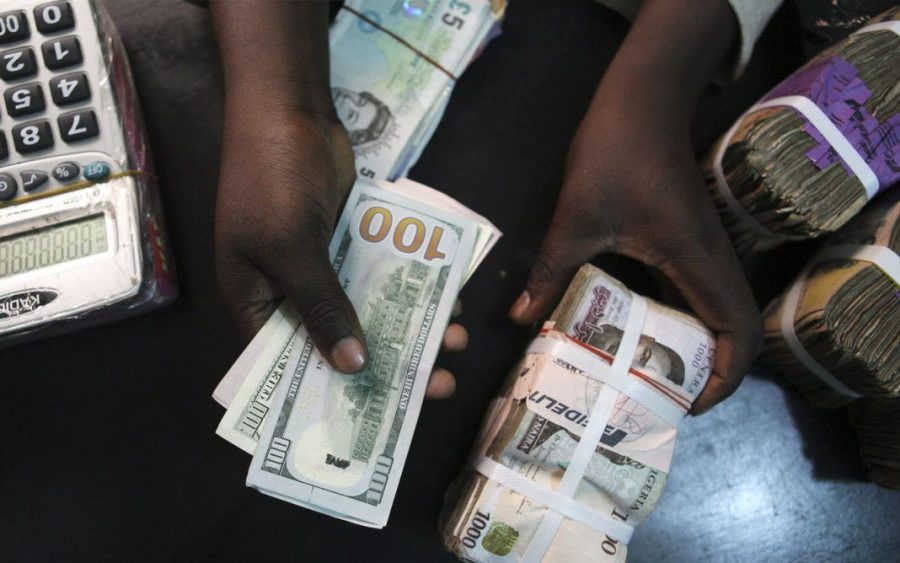Nigeria’s exchange rate at the NAFEX window depreciated against the dollar to close at N386/$1 during intraday trading on Monday, October 5, after the public holiday.
In sharp contrast, the naira appreciated against the dollar, closing at N458/$1 at the parallel market on Monday, October 5, 2020, as the Bureau De Change Operators get another round of dollar supply. The CBN in its latest report projected that the country’s external reserve will fall below $34.3 billion, from the present $35.7 billion before the end of the year
Parallel market: At the black market where forex is traded unofficially, the Naira appreciated against the dollar to close at N458/$1 on Monday, according to information from Abokifx, a prominent FX tracking website. This represents a N7 gain when compared to the N465/$1 that it was exchanged for on Friday, October 2.
READ ALSO: Exchange rate falls across the forex markets as CBN devalues the naira
Current developments
- The local currency has strengthened by about 7.8% within the last one week at the black market, as the CBN introduced some measures targeted at exporters and importers, in order to try to boost the supply of dollars in the foreign exchange market, and reduce the high demand for forex by traders.
- The CBN has sold over $250 million to BDCs since the resumed forex sales on Monday, September 7, 2020. This was expected to inject more liquidity to the retail end of the foreign exchange market and discourage hoarding and speculation.
- However, the exchange rate against the dollar has failed to sustain the initial gains made, after the CBN announced plans to provide liquidity.
- BDC operators have urged the apex bank to reconsider the margin allowed for the currency traders, as it was inadequate to meet their expenses.
- We also noted that forex traders monitored during the previous week, appeared to hoard forex, as they anticipated further depreciation in the market.
- There has been a drop in speculative buying of foreign exchange, although demand backlog by manufacturers and foreign investors still puts pressure, and creates a volatile situation in the foreign exchange market.
READ: U.S dollar posts best monthly gains in 14 months
NAFEX: The Naira depreciated against the dollar at the Investors and Exporters (I&E) window on Monday, closing at N386/$1.
- This represents a 20 kobo drop when compared to the N385.80 that it exchanged for on Friday, October 2.
- The opening indicative rate was N386.53 to a dollar on Monday. This represents a 28 kobo drop when compared to the N386.25 that was recorded on Friday.
- The N393.01 to a dollar is the highest rate during intraday trading before closing at N386. The Naira also sold for as low as N380/$1 during intraday trading
READ: Naira stabilizes across forex markets, as BDCs get another round of dollar allocation
Forex turnover: Forex turnover at the Investor and Exporters (I&E) window, declined by 64.5% on Monday, October 5, 2020.
- According to the data tracked by Nairametrics from FMDQ, forex turnover dropped from $102.02 million on Friday, October 2, 2020, to $36.24 million on Monday, October 5, 2020.
- The CBN had in the past few weeks moved to clear the huge backlog of foreign exchange demand, especially by foreign investors wishing to repatriate back their funds.
- The drop in forex supply reinforces the volatility of the foreign exchange market. The supply of dollars has been on a decline for months due to low oil prices and the absence of foreign capital inflow into the country.
- The average daily forex sale for last week was about $169.93 million, which represents a huge increase from the $34.5 million that was recorded the previous week.
- Total forex trading at the NAFEX window in the month of August was about $857 million, compared to $937 million in July.
- The Central Bank of Nigeria in its latest Monetary, Credit, Foreign Trade and Exchange Policy Guideline for fiscal years 2020/2021, projected that Nigeria’s external reserve is expected to be between $29.9 billion and $34.3 billion due to declining oil prices and the impact of the coronavirus pandemic.
















Give me your number so I can call you